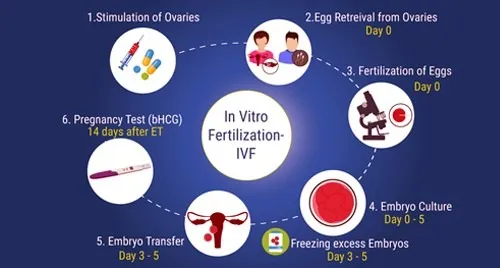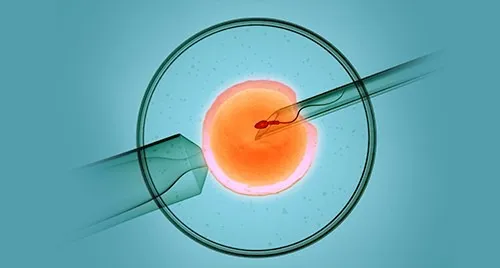In vitro fertilization or IVF is a technology for assistive reproduction. It retrieves eggs from a woman’s ovaries and then fertilizes them with sperm. This fertilized egg is an embryo. The embryo can be frozen for storage or directly transferred to a woman’s uterus.
It depends on your situation, how an IVF treatment will work for you. It includes:
- Your eggs and your partner’s sperm
- Your eggs and donor sperm
- Donor eggs and your partner’s sperm
- Donor eggs and donor sperm
- Donated embryos
You may also consider the option of implanting embryos in a surrogate or gestational carrier, a woman who would carry your baby for you. It is important to get IVF done from a well known IVF centre.
Why is In Vitro Fertilization performed?
IVF helps you with your infertility, giving you a chance to have a baby.
Some Infertility issues which only IVF can solve:
- Reduced fertility over the age of 40 in women
- Endometriosis
- Uterine fibroids
- Blocked fallopian tubes
- Reduction in ovarian function
- Male infertility, like abnormalities in sperm shape or low sperm count
- Unexplained infertility
You can also choose IVF if there is a risk of passing a genetic disorder on to your offspring. Your medical lab will then test the embryos for genetic problems and implant embryos with no genetic issues.
Factors to consider before going for IVF?
Going for an IVF treatment is a very personal decision because you have to consider several factors like:
- How will you deal with your unused embryos?
- How many embryos do you want to transfer? Remember, the more embryos you choose to transfer, the risk of a multiple pregnancy increases.
- What if you have twins, triplets, or higher multiple pregnancies?
- How will you deal with legal and emotional issues linked with using donated sperms, eggs, embryos, or a surrogate?
- Are you ready financially, physically, and emotionally for an IVF?
If you have successfully solved the above-mentioned question, then there is no need for you to worry, as the rest of the procedure is in your doctor’s hands.
How is IVF performed?

There are five stages involved in an IVF process:
1. Stimulation
2. Egg retrieval
3. Insemination
4. Embryo culture
5. Transfer
Stimulation
IVF requires multiple eggs, but a woman’s body produces only one during a menstrual cycle. Multiple eggs increase the chances of forming a viable embryo. Your doctor will give you fertility drugs to increase the number of eggs your body produces. While you are taking these drugs, your doctor will perform periodic ultrasounds and blood tests. Performing tests will allow them to monitor your eggs’ production and know when to retrieve them.
Egg Retrieval
Egg retrieval, also known as follicular aspiration, is a surgical procedure conducted using anesthesia. Your doctor will use an ultrasound wand directing a needle from your vagina into your ovary and into a follicle that contains your eggs. This needle will suction eggs and fluid from each of your follicles.
Insemination
Your male partner will now need to provide a semen sample. A technician will mix the eggs and sperms in a petri dish.
Embryo Culture
Your doctor will observe the fertilized eggs to ensure that they’re dividing and growing. After this, the embryos may go through genetic testing.
Transfer
In 3-5 days after fertilization, these embryos will have grown large enough to be implanted. For implantation, your doctor will place a small tube called a catheter into your vagina, through your cervix, and into your uterus. The embryo would subsequently be implanted into your uterus.
After the embryo attaches itself into your uterus, pregnancy will develop in 6 to 10 days. Your doctor can use a blood test to determine if you are pregnant.
Complications in an IVF Treatment
Even though IVF is a miracle treatment for infertile couples, it does have complications:
- Miscarriage
- Risk of multiple pregnancies, leading to premature birth and low birth weight
- Ectopic pregnancy (eggs implant outside the uterus)
- Ovarian hyperstimulation syndrome (OHSS), a rare condition of an excess of fluid in the chest and abdomen
- Infection, bleeding, or damage to the bowels or bladder ( very rare)
Deciding to go for an IVF treatment no matter your first attempt or second is a complicated decision. The financial, physical, and emotional weight of this treatment might come out as difficult for you.
Before deciding anything speak with your IVF specialist thoroughly to find out if in vitro fertilization is the right choice for you and your family. Also, join a support group or counsellor to assist you and your partner through this treatment.


